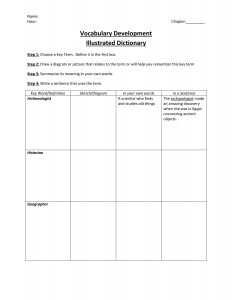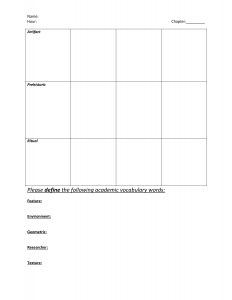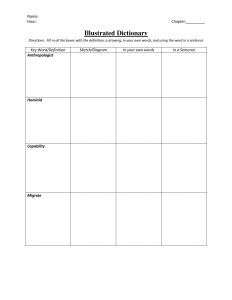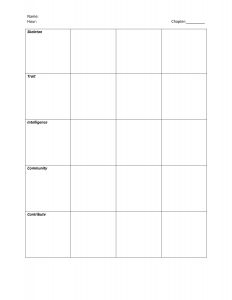Example template:
Chapter 1 Vocabulary
Archaeologist: an expert who studies the past by examining objects that people have left behind.
Historian: an expert who studies and records the past.
Geographer: an expert who studies and creates maps of Earth’s natural and human-made features.
Artifact: an object made or used by people in the past.
Prehistoric: before written history.
Ritual: relating to a ceremony, such as a religious ceremony.
Chapter 2 Vocabulary
- Migrate To move from one geographic region to another
- Anthropologist A scientist who studies human development and culture
- Hominids An early ancestor of Humans
- CapabilityAbility or skill
- SkeletonThe bones that make up the body of a person or animal
- TraitA special feature or characteristic
- IntelligenceA strong mental ability to reason and gain knowledge
- Community A group of people who live in the same area and are united by common interests
- Contribute To give, along with others, to a common cause
Chapter 3:
Agriculture: the business of farming; growing crops and raising animals.
Catal Hoyuk: a Neolithic town discovered in central Turkey
Domesticate: to train a wild animal to be useful to humans
Fertile Crescent: an arc-shaped region in southwest Asia, with rich soil
Neolithic Age: the later part of the Stone Age, called the New Stone Age, lasted from around 8000 B.C.E. to 3000 B.C.E
Nomad: One who moves from place to place with no permanent home
Paleolithic Age: .the first period of the Stone Age called the Old Stone Age. From about 2 million years ago to around 8000 B.C.E.
Resource: something that can be used to fulfill a need
Trade: the business of buying and selling or exchanging items
Chapter 4: The Rise of Sumerian City-States
Mesopotamia: in ancient times, the geographic area located between the Tigris and Euphrates River
Tigris River: one of the two largest rivers in Southwest Asia that flow from the mountains in Turkey to the Persian Gulf
Euphrates: one of the two largest rivers in Southwest Asia that flow from mountains in Turkey to the Persian Gulf
Sumer: an area in southern Mesopotamia, where cities first appeared
Irrigation: a means of supplying land with water
Levee: a wall of earth built to prevent a river from flooding its banks
Silt: fine particles of rock
City-state: an early city that was like a small, independent country with its own laws and government
Chapter 5: Ancient Sumer
Civilization: A society marked by developed arts, sciences, government, and social structure
Social structure: The way a civilization is organized
Technology: The use of tools and other inventions for practical purposes
Merchant: A person who makes money by selling goods
Artisan: A craftsperson
Scribe: A person who writes
Ziggurat: An ancient Mesopotamian temple tower with outside staircases and shrine at the top
Culture: A characteristic of civilization that includes the beliefs and behaviors of a society or a group of people
Cuneiform: Writing that uses wedge-shaped characters
Pictograph: A symbol that stands for an object
DOC: ch 5 illustrated dictionary
Chapter 6: Mesopotamian Empires
empire: A large territory in which several groups of people are ruled by a single leader or government
Tribute: Wealth sent from one country or ruler to another as sign that the other is superior
Economy: The way a region or country uses resources to produce and sell or trade goods and services to meet people’s needs and wants
Capital: A city that is the center of government
Code of Laws: A collection of written laws and rules
Siege: A military blockade and attack on a city to force it to surrender
Invader: Someone who forces entry into a place where they are unwanted
Unify: To join together
Chapter 7-8:
Chapter 7-8:
Nile River: The longest river in the world, flowing through eastern Africa to a delta in northeast Egypt
Egypt: A nation in northeast Africa, first settled around 3100 B.C.E.
Kush: A society along the Nile River, south of Egypt, from about 2000 B.C.E. to 350 C.E.
Mediterranean Sea: A body of water north of Africa
Pharaoh: A ruler of ancient Egypt
Hatshepsut: The first woman Pharaoh of Ancient Egypt
Ramses II: An ancient Egyptian pharaoh, known as “Ramses the Great”; skilled as a military leader; and responsible for building many monuments, including the temple at Abu Simbel.
Treaty: A written agreement by which two or more states agree to peaceful relations
Period: a length of time
Accomplish: to complete something successfully
Structure: something that has been built
Authority: the government or controlling power
Reign: the period of time someone rules, usually royalty
Chapter 9: Daily Life in Ancient Egypt
Social Pyramid: A pyramid outline showing the positions of social classes according to their status in a society
Social Class: A group in a society that is ranked by factors such as wealth, property, and rights.
Status: Importance
Noble: Of high birth or rank
Peasant: A person who does farmwork for wealthy landowners.
Afterlife: An existence after death.
Hieroglyph: A symbol used in hieroglyphics, a system of writing developed around 3000 B.C. E.
Supreme: The highest ruling level
Occupy: To take up or fill
Rigid: Stiff; unable to bend
Role: A position based on socially expected behavior
Neutral: Not taking sides or getting involved in disagreements
World Religions Vocabulary:
DOC: World Religions Vocabulary
PDF: World Religions Vocabulary
Chapter 20:
EQ: What do Shang artifacts reveal about this Civilization?
Anyang: Location where ruins were found from the Shang dynasties, China’s first civilization
Shang Dynasty: One of the first Chinese dynasties, ruled from 1700 to 1122 B.C.E.
Clan: A large group of family members and friends.
Bronze: A strong metal alloy made from copper.
Military: Relating to the Army.
Ancestor Worship: Honoring of ancestors through rituals, such as offering food to the spirits of the dead.
Oracle bone: A piece of bone or shell heated and cracked by holy men to seek advice from a king’s ancestors.
Chapter 21
Three Chinese Philosophies
Zhou Dynasty: A line of rulers in China, from about 1045 to 256 B.C.E.
Mandate of Heaven: A power or law believed to be granted by a god
Feudalism: A system of government based on landowners and tenants
Confucianism: A Chinese philosophy that emphasizes proper behavior
Civil servant: A person who works for a government
Daoism: A Chinese Philosophy that emphasizes living in harmony with nature
Yin and Yang: The Daoist concept of opposing forces of nature
Legalism: A Chinese philosophy that emphasizes strict obedience to laws
Chapter 24
Silk Road: A network of trade routes that stretched for more than four thousand miles across Asia
Trade route: A network of roads along which traders traveled
Caravan: A group of people traveling together.
Cultural diffusion: the spreading of cultural traits, such as goods and ideas, from one culture to another, or within one culture
Dominated: To have control or power over something
Linked: to connect two or more people or things
Acquire: To come into possession of something
Oxygen: A gas in the air that people and animals need to breathe to live
Occurs: To take place
Chapter 25
Geography and the Settlement of Greece
Peninsula: A body of land that is surrounded on three sides by water
Aegean Sea: An arm of the Mediterranean Sea, east of Greece
Colony: A settlement under control of a usually distant country
Consulting: To get an opinion and information from someone
Participate: To take part in something, such as a game or activity
Chapter 26
The Rise of Democracy
Monarchy: A government in which the ruling power is in the hands of one person
Aristocrat: A member of the most powerful class in ancient Greek society.
Oligarchy: A government in which the ruling power is in the hands of a few people.
Tyranny: A government in which absolute ruling power is held by a person who is not a lawful king.
Democracy: A government in which power is held by the people, who exercise power directly or through elected representative.
Citizen: A person who has certain rights and duties in a city-state or nation.
Assembly: A group of citizens, in an ancient Greek democracy, with the power to pass laws.



